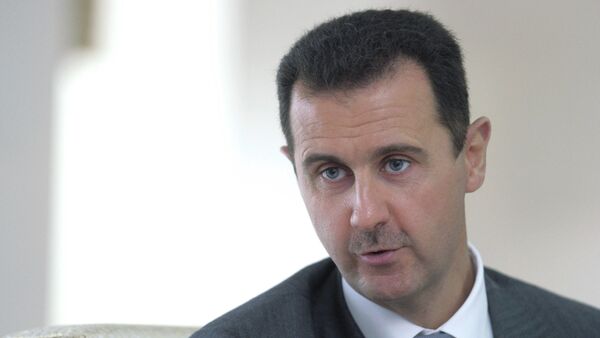The issue of Syrian President Bashar al-Assad’s departure from power is secondary, while the main problem to be addressed at the moment is how to ensure transition from violence to a new, democratic stage in Syria’s development, Samir Aita, member of Syria’s opposition Democratic Forum group, said on Monday.
“We want to create a state in Syria where representatives of various nationalities and religions could live on the basis of equality,” Aita said during a news conference in Moscow following talks with Russian Foreign Minister Sergei Lavrov.
Aita said the Syrian delegation discussed the issue of Assad’s departure with Russian diplomats.
“We told our Russian friends directly: you believe that the problem is with an individual,” said Michel Kilo, a Syrian writer and veteran of the opposition scene who led the delegation at the talks.
“But look at the real situation in Syria, at the violence and destruction – if compared to this, the problem of Assad himself is minor,” he added.
Delegation members said the Assad government has failed to listen to their demands and engage in a peaceful dialogue.
“They don’t want dialogue. They replaced the dialogue that we are calling for with the dialogue of cannons and artillery,” Kilo told journalists.
Another Democratic Forum member, Hazem Nahar, criticized Russia’s position on Syria, which he said has seen no significant changes despite soaring violence in Syria, and warned that Moscow’s reluctance to strip the Assad government of its support would backlash.
“Unfortunately, Russia has a very bad reputation among Syrian people, and not only opposition supporters,” he said.
“We’ve been trying to answer the question why Russia has stuck so strictly with the position of the Syrian regime?” he said, adding that Moscow was “deepening the crisis” and “hampering a solution since the very beginning of the crisis in Syria.”
Russia and China have twice vetoed UN Security Council resolutions condemning the Assad government, citing a pro-rebel bias. Moscow has also made it clear it would not support military intervention in Syria, saying it was up to Syrians themselves to resolve the crisis by launching a broad national dialogue.
Such a stance is “very dangerous” because “the more you wait, the greater the risk Islamists will come to power in Syria,” Nahar warned.
“If Russia does not change its position, Syria will stop being its ally,” he added.
Syrian opposition groups and Western powers, particularly the United States, have strongly criticized Russia and China for backing Assad, with U.S. Secretary of State Hillary Clinton saying last week that Moscow and Beijing “will pay a price” for standing up on his behalf.
Russia has dismissed the accusations as Cold War-era rhetoric. Commenting on Clinton’s statement, Russian Deputy Foreign Minister Sergei Ryabkov said last week: "I categorically reject the formulation that Russia supports Bashar al-Assad's regime in the situation that has developed in Syria.”
“What the Russian Federation is engaged in is not supporting specific politicians or political figures in Syria, but in work that we hope will help create important dialogue between the authorities and the opposition,” he said.
The Russian foreign minister said in June that Russia would not oppose Assad’s departure if that is the result of the dialogue between Syrians themselves.
“If the Syrians agree (about Assad’s departure) between each other, we will only be happy to support such a solution,” Lavrov said, adding that imposing the conditions for such a dialogue from outside was “unacceptable.”
On Monday, UN and Arab League envoy Kofi Annan visited Syria in an attempt to salvage his battered peace plan designed to end more than a year of bloodshed there. Annan said his talks with Assad were “positive and constructive.”
Moscow has supported both the Annan plan and a transition plan endorsed during a Syria Action Group in Geneva on June 30, which calls for the creation of a transitional government in Syria to involve representatives of both the Assad government and opposition groups.


